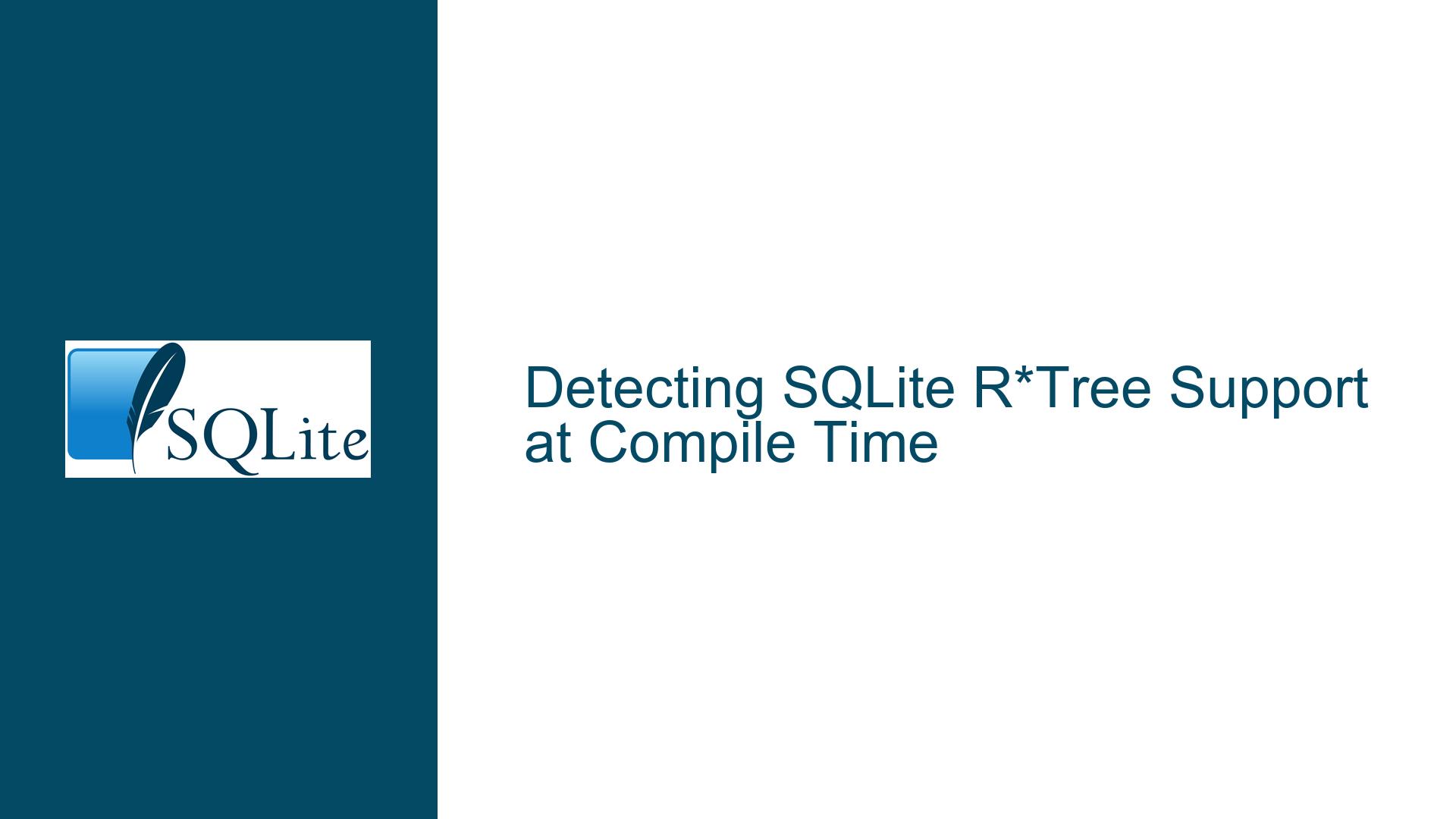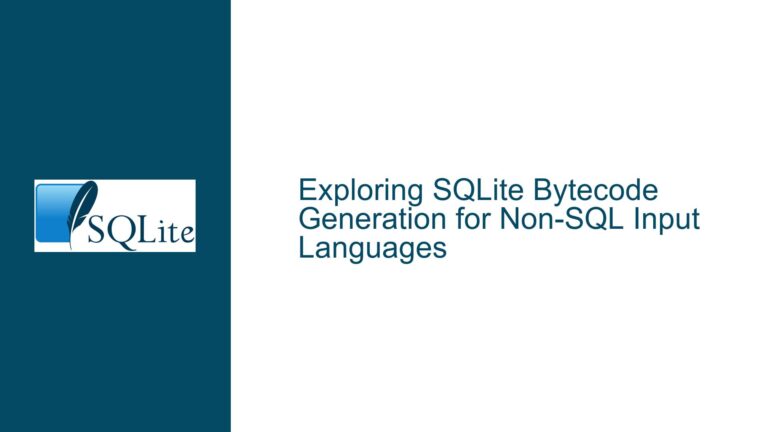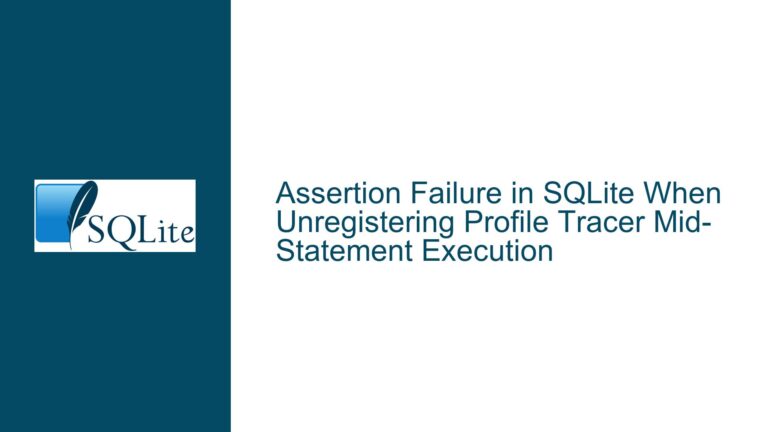Detecting SQLite R*Tree Support at Compile Time
SQLite R*Tree Support Detection Challenges
When working with SQLite, one of the most powerful features available is the RTree module, which provides efficient spatial indexing for applications that require geospatial or multidimensional data handling. However, leveraging this feature requires that the SQLite library being used has been compiled with the SQLITE_ENABLE_RTREE flag enabled. The challenge arises when developers need to determine, at compile time, whether the SQLite library they are linking against supports the RTree module. This is particularly important for ensuring that the application can gracefully handle scenarios where the R*Tree module is unavailable, or to conditionally compile code that depends on this feature.
The core issue revolves around the absence of a straightforward mechanism to detect RTree support directly from the sqlite3.h header file. Unlike some other features in SQLite, the presence of RTree support is not explicitly exposed through preprocessor definitions in the header file. This lack of explicit configuration details in the header file complicates the process of writing portable code that can adapt to different SQLite builds.
Absence of Preprocessor Definitions for R*Tree Support
The primary reason for the difficulty in detecting R*Tree support at compile time is the way SQLite is designed to be highly configurable. SQLite allows for a wide range of compile-time options, such as SQLITE_ENABLE_RTREE, which can be enabled or disabled depending on the specific needs of the application. These options are typically passed as compiler flags during the build process of the SQLite library itself. However, once the library is compiled, these configuration details are not directly exposed in the sqlite3.h header file.
This design choice is intentional, as SQLite aims to maintain a minimal and portable header file that does not expose internal build configurations. While this approach keeps the header file clean and avoids unnecessary complexity, it also means that developers cannot rely on preprocessor definitions like #ifdef SQLITE_ENABLE_RTREE to detect R*Tree support at compile time. This limitation is particularly problematic when linking against a precompiled SQLite library, where the build configuration is unknown and cannot be inferred from the header file alone.
Another factor contributing to this issue is the dynamic nature of SQLite linking. In many cases, SQLite is linked dynamically at runtime, meaning that the library does not need to be present at compile time. This further complicates the detection process, as compile-time checks are inherently limited to the information available during the compilation phase. Without access to the actual SQLite binary or its build configuration, compile-time detection of R*Tree support becomes impractical.
Using PRAGMA compile_options and Symbol Dumping Tools
To address the challenge of detecting RTree support, developers can employ a combination of runtime checks and build-time configuration generation. One of the most reliable methods is to use the PRAGMA compile_options command, which returns a list of compile-time options that were used when building the SQLite library. By executing this pragma at runtime, developers can programmatically determine whether the SQLITE_ENABLE_RTREE option was enabled. While this approach does not provide compile-time detection, it offers a robust way to handle RTree support dynamically within the application.
For scenarios where compile-time detection is essential, developers can generate a custom configuration header file during the build process. This can be achieved by writing a script that queries the SQLite installation for its compile options and generates a sqlite3config.h file with appropriate definitions, such as HAVE_RTREE. This generated header file can then be included in the application’s source code, allowing for conditional compilation based on the presence of R*Tree support.
Additionally, tools for dumping exported symbols from linkable objects can be used to inspect the SQLite library for RTree-related symbols. For example, on Unix-like systems, the nm command can be used to list the symbols in a shared library, while on Windows, the dumpbin utility can serve a similar purpose. By searching for symbols related to the RTree module, such as sqlite3_rtree_geometry_callback, developers can infer whether the library supports R*Tree functionality.
Below is a table summarizing the methods for detecting R*Tree support:
| Method | Description | Pros | Cons |
|---|---|---|---|
PRAGMA compile_options | Runtime query to list compile-time options used in the SQLite library. | Reliable and works with precompiled libraries. | Does not provide compile-time detection. |
| Custom Configuration Header | Generate a sqlite3config.h file during build with R*Tree support details. | Enables compile-time detection and conditional compilation. | Requires additional build scripting and setup. |
| Symbol Dumping Tools | Inspect the SQLite library for R*Tree-related symbols. | Works with precompiled libraries and provides detailed symbol info. | Platform-dependent and requires additional tooling. |
In conclusion, while SQLite’s design does not natively support compile-time detection of RTree support through the sqlite3.h header file, developers can employ a combination of runtime checks, build-time configuration generation, and symbol inspection tools to achieve the desired functionality. By understanding the limitations and available workarounds, developers can ensure that their applications gracefully handle the presence or absence of RTree support, leading to more robust and portable code.






